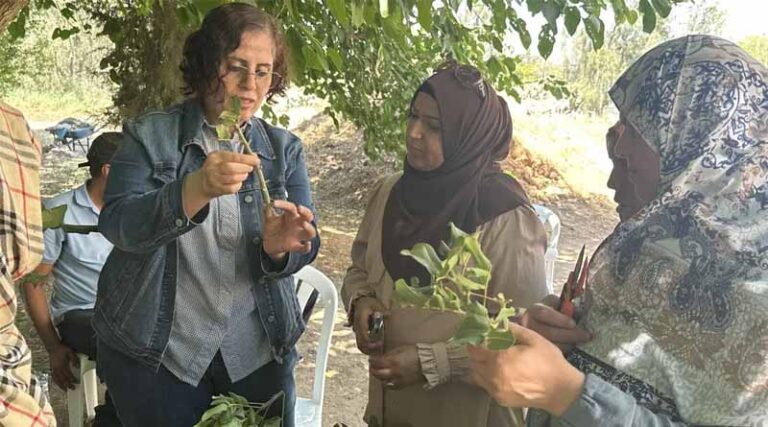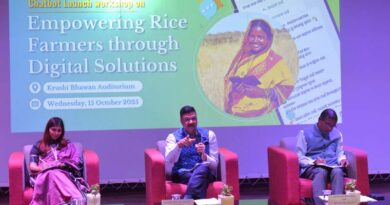
Unlocking the Potential of Carob in Tunisia through Vegetative Propagation
11 November 2025, Tunisia: A breakthrough in carob propagation is empowering Tunisia’s forestry sector to restore degraded lands, support rural livelihoods, and enhance climate adaptation.
Carob (Ceratonia siliqua), a native Mediterranean tree, stands out as one of Tunisia’s most promising climate-resilient crops. With its ability to thrive in drought-prone, degraded soils, carob offers ecological protection, economic opportunity, and social value, particularly in silvopastoral systems that integrate trees, forages, and livestock.
A Tree Built for the Drylands
Carob’s deep roots stabilize fragile soils and prevent their erosion, while its canopy offers shade and shelter for grazing animals. Beyond these environmental benefits, the tree’s sweet pods are in growing demand across the food and pharmaceutical industries in Tunisia. They are processed into natural remedies and sugar substitutes, flour, syrup, and molasses, and used in traditional Tunisian foods such as Bsissa, a dessert typically made from roasted wheat and barley, which is increasingly being prepared with carob flour instead. As a native, drought-tolerant species, carob offers a more sustainable alternative to water-intensive cereals, making carob-based Bsissa one of the most sought-after and climate-friendly varieties in Tunisia. Additionally, the discarded pods and leaves can also be repurposed as supplemental feed for livestock. Rich in natural sugars, the pods serve as a high-energy feed, helping farmers bridge forage shortages during dry periods.
The Propagation Challenge
Despite rising interest, expanding carob plantations has been difficult. Most trees are grown from seed, which is a slow and unreliable method that produces variable quality and an unpredictable ratio of male to female trees, with only females bearing pods. Grafting, the standard alternative, is highly technical and labor-intensive, with success rates often below 20%. These constraints have limited national reforestation efforts in Tunisia, burdening the Direction Générale des Forêts (DGF) and local farmers, and further slowing down national efforts to scale up carbon-based systems.
A New Approach: Vegetation Propagation
To address this challenge, ICARDA, under the TransforMed PRIMA-funded project, and with support from the CGIAR Research Initiative on Multifunctional Landscapes, organized a capacity-building event focused on the vegetative propagation of carob trees.
Held in Tunisia, the training brought together DGF staff from five governorates: Sousse, Zaghouan, Kairouan, Siliana, and Sidi Bouzid, for hands-on learning in a simple and reliable way to propagate carob without seeds or grafting.
The method, known as vegetative propagation, is essentially a cloning process, as it produces plants that are identical to the parent tree. This is especially useful for carob, where only female trees bear fruit, and farmers seek specific traits such as high yield or superior pod quality. While grafting and other techniques, such as air-layering, exist, they often have low success rates or are less practical on a large scale.
Participants practiced every step from selecting healthy cuttings and applying rooting hormones to preparing pots and planting media. In addition to its ecological and economic benefits, the approach not only facilitates propagation but also increases the likelihood of growing vigorous, high-quality female trees.
“If this methodology proves successful, it will be a game-changer for the DGF,” said Mr. Kalifa Jellali, Senior Engineer, Deputy Director of Pastoral Land and Desertification at DGF. “It could significantly reduce our costs and improve planting outcomes.”
Rabia Zeyri, Chief of the Subdirectorate of Chebika, noted:
“Providing farmers with female seedlings of high quality will reduce their risks and encourage wider adoption of carob cultivation.”
Scaling Up for National Impact
At the end of training, participants developed a roadmap for testing and scaling the approach across Tunisia. Each nursery team will pilot the technique in their region, determine the optimal propagation season, and begin multiplying elite carob trees.
If successful, this initiative could lay the foundation for a national vegetative propagation program, unlocking the full potential of carob in sustainable agriculture, silvopastoral development, and landscape restoration.
A Climate-Resilient Future
This training marked a pivotal step in advancing climate-smart silvopastoral systems in Tunisia. By simplifying carob propagation, ICARDA and its partners are equipping forestry institutions with practical approaches that reduce costs, strengthen institutional capacity, and enable large-scale adoption of a species that supports biodiversity, rural livelihoods, and food and fodder security.
As Tunisia accelerates its sustainability agenda, carob is playing an increasingly important role in balancing ecological restoration with economic growth.
This work is supported by the PRIMA TransforMed project and the CGIAR Science Program on Multifunctional Landscapes.
Also Read: Maharashtra’s Sweet Lime Farmers Hit by 48°C Heat, Drought, and Unpaid Insurance Claims
📢 If You’re in Agriculture, Make Sure the Right People Hear Your Story.
From product launches to strategic announcements, Global Agriculture offers unmatched visibility across international agri-business markets. Connect with us at pr@global-agriculture.com to explore editorial and advertising opportunities that reach the right audience, worldwide.






